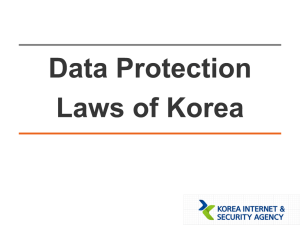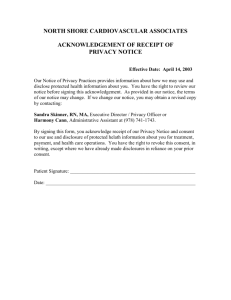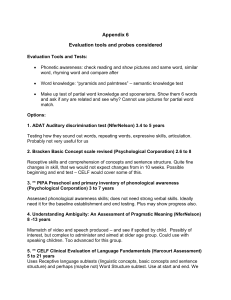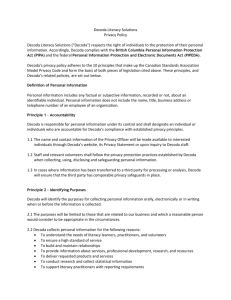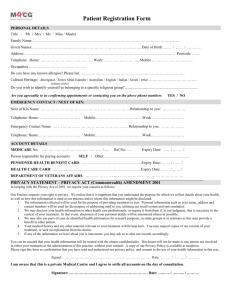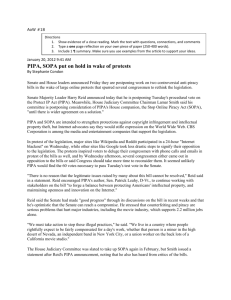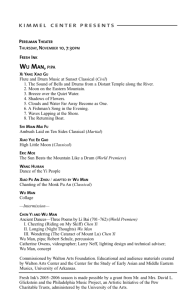Guide to the Personal Information Protection Act
advertisement
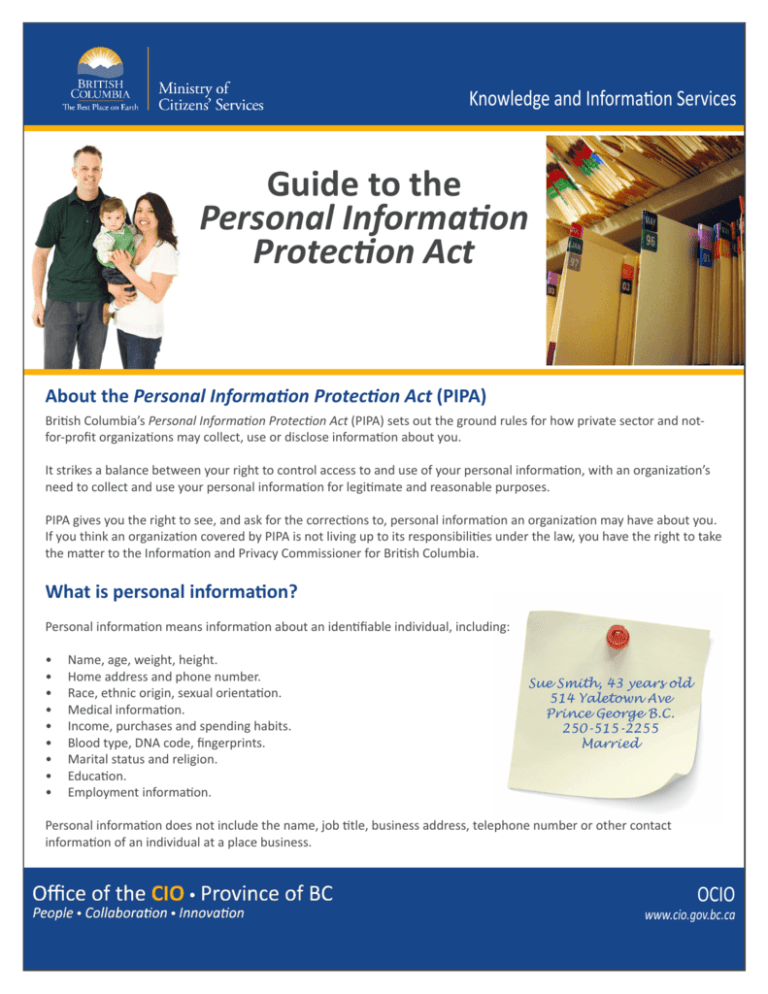
Knowledge and Information Services Guide to the Personal Information Protection Act About the Personal Information Protection Act (PIPA) British Columbia’s Personal Information Protection Act (PIPA) sets out the ground rules for how private sector and notfor-profit organizations may collect, use or disclose information about you. It strikes a balance between your right to control access to and use of your personal information, with an organization’s need to collect and use your personal information for legitimate and reasonable purposes. PIPA gives you the right to see, and ask for the corrections to, personal information an organization may have about you. If you think an organization covered by PIPA is not living up to its responsibilities under the law, you have the right to take the matter to the Information and Privacy Commissioner for British Columbia. What is personal information? Personal information means information about an identifiable individual, including: • • • • • • • • • Name, age, weight, height. Home address and phone number. Race, ethnic origin, sexual orientation. Medical information. Income, purchases and spending habits. Blood type, DNA code, fingerprints. Marital status and religion. Education. Employment information. Sue Smith, 43 years old 514 Yaletown Ave Prince George B.C. 250-515-2255 Married Personal information does not include the name, job title, business address, telephone number or other contact information of an individual at a place business. OCIO www.cio.gov.bc.ca Knowledge and Information Services What is covered by PIPA? PIPA gives you the right to: PIPA covers all private sector organizations in B.C., including: • Know why an organization collects, uses or discloses your personal information. • Expect an organization to collect, use or disclose your personal information reasonably and appropriately. • Know who in the organization is responsible for protecting your personal information. • Expect an organization to protect your personal information by taking appropriate security measures. • Expect the personal information an organization uses or discloses about you to be accurate and complete. • Request access to your personal information and ask for corrections. • Complain about how an organization handles your personal information. • • • • • • A person. A corporation. A partnership. An unincorporated association. A trade union. A trust. • A not-for-profit organization. What is not covered by PIPA? • A government agency already covered by the federal Privacy Act or the B.C. Freedom of Information and Protection of Privacy Act. • A federally-regulated organization that is already covered by the federal Personal Information Protection and Electronic Documents Act (e.g. banks, airlines, telecommunications, inter-provincial transportation and radio and television broadcasting companies). • The collection, use or disclosure of personal information solely for journalistic, artistic or literary purposes. • An individual’s collection, use or disclosure of personal information for personal or domestic purposes (e.g. family or home activities). How does PIPA protect my personal information? PIPA requires organizations to: • Obtain your consent when they collect, use or disclose your personal information (except in limited circumstances where no consent is required*). • Collect information by fair and lawful means. • Tell you how your personal information is being used and to whom it has been disclosed. • Have personal information policies that are clear, understandable and readily available. • Destroy, erase or make anonymous personal information about you that it no longer needs for the purpose for which it was collected or for a related business or legal reason. Your ability to control your personal information is key to your right to privacy. Under PIPA, an organization may not: PIPA gives you control over your personal information by requiring organizations to obtain your consent to collect, use or disclose personal information about you. (There are some limited exceptions to the consent requirement*). • Refuse to supply you with a product or a service because you do not consent to the collection, use or disclosure of your personal information for the purposes that are not necessary for the transaction. • Use or disclose your information for any purpose other than to which you have consented (except in It gives you certain rights and imposes specific obligations on organizations. circumstances where no consent is required*). OCIO www.cio.gov.bc.ca Knowledge and Information Services *Exceptions to the Consent Requirement There are exceptions to the consent requirement. For example: an organization may not need to obtain consent if: • Your personal information is available from a public source (e.g. a telephone book). • Collecting or disclosing the information clearly benefits you or is necessary for medical treatment and your consent cannot be obtained in a timely way. • The information is needed for an investigation (e.g. criminal, breach of contract, fraud) and getting consent might compromise the information’s availability or accuracy. How can I see the personal information an organization has about me? • Send a written request to the organization holding your personal information. You must provide enough detail to allow the organization to identify the information you want; for example included dates, account numbers, and the names or positions of people you may have dealt with at the organization. • Organizations must provide the information requested within 30 business days (unless an extension of time is warrented) and at minimal or no cost. How can I correct errors or omissions in my personal information? • Write to the organization that has personal information about you and explain the correction you are requesting and why. Supply copies of any documents that support your request. • If the organization refuses to correct your personal information, it must attach your request for correction to the file. When did PIPA come in to force? PIPA came in to force on January 1, 2004. What if I believe my privacy rights are being violated? Contact the person responsible for handling privacy issues within the organization if: • You run into any difficulties obtaining your personal information. • An organization refuses to correct personal information you consider inaccurate or incomplete. • You suspect your personal information has been improperly collected, used or disclosed. • You believe an organization is not following any provision of the law. Where can I take my concerns? • You should try to settle the matter directly with the organization by contacting the person responsible for handling privacy issues within the organization. • If you are not satisfied with the organization’s response, you may ask the Office of the Information and Privacy Commissioner of B.C. to review the matter. For more information or advice on how to proceed, you can contact the Commissioner’s office at: Office of the Information and Privacy Commissioner for British Columbia PO Box 9038, Stn. Prov. Govt. Victoria, BC V8W 9A4 E-mail:info@oipc.bc.ca Web Site: www.oipc.bc.ca Telephone: (250) 387-5629 For toll-free access call Enquiry BC at one of the numbers listed below and request a transfer to (250) 387-5629: Vancouver: (604) 660-2421 Elsewhere in BC: (800) 663-7867 OCIO www.cio.gov.bc.ca Knowledge and Information Services Role of the Information and Privacy Commissioner for B.C. • The Commissioner, an independent officer of the Legislature, has the power to investigate your complaint and authorize mediation and negotiation to resolve disputes. • The Commissioner may also initiate his own investigation or review how an organization handles personal information. • The Commissioner can order an organization to release your personal information to you or correct inaccuracies. • The Commissioner can order an organization to change its personal information practices. Role of the Office of the Chief Information Officer for B.C. The Office of the Chief Information Officer (OCIO) is the central government agency responsible for PIPA. The OCIO publishes policies, implementation guidelines and tools that assist the B.C. privacy sector to comply with its privacy` responsibilities. The OCIO also operates a Privacy Helpline, providing support, direction and training to private sector organizations and the public on PIPA’s requirements. For more information about the OCIO, please visit the OCIO website: www.cio.gov.bc.ca CONTACT US If you have any questions about how PIPA might affect you or your organization or if you require implementation support or training, please contact: Knowledge and Information Services Office of the Chief Information Officer Ministry of Citizens’ Services PO Box 9493, Stn Prov Govt Victoria, BC V8W 9N7 Phone:(250) 356-1851 Fax: (250) 953-0455 Email: CPIAADMIN@gov.bc.ca Web: www.cio.gov.bc.ca/cio/priv_leg/pipa/index. page? Privacy Helpline: Phone: (250) 356-1851 Email: CPIAADMIN@gov.bc.ca For toll-free access call Enquiry BC at one of the numbers listed below and request a transfer to (250) 387-5629: Vancouver: (604) 660-2421 Elsewhere in BC: (800) 663-7867 OCIO www.cio.gov.bc.ca

